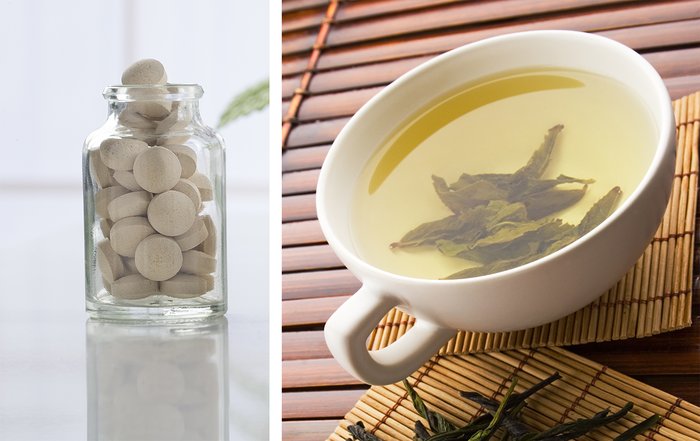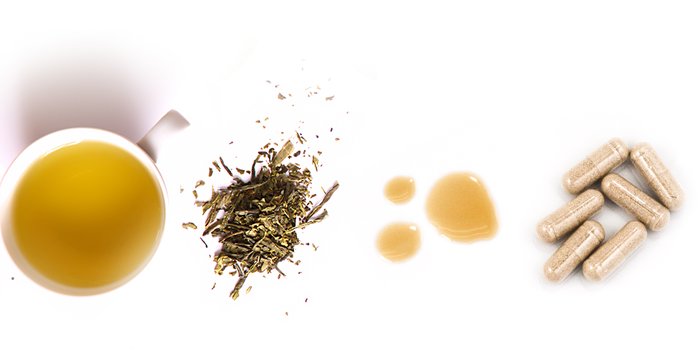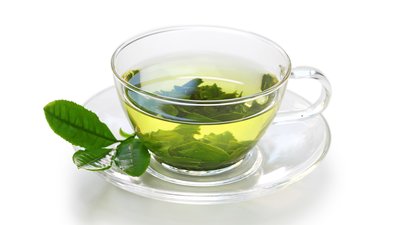If someone told you that a leaf could reduce fat mass, reduce muscle soreness, and promote overall well-being, what leaf would you assume they were talking about? No, it's not kale. It's green tea.
This centuries-old beverage originates from China, but today, tea is the most widely consumed beverage in the world after water. Why do people drink tea? For energy, mental clarity, and because it's part of their daily ritual, but increasingly, they also drink it for its purported health and restorative benefits.
Whether you're considering adding a cup to your daily routine, or trying the new generation of tea-based capsules or supplements, here's what you need to know.
What is Green Tea?
Green, black, white, and oolong teas are all derived from the leaves of the Camellia sinensis plant. What makes each of these teas different is how the leaves are processed.
When making black tea, leaves are harvested, mechanically broken down (torn or crushed), and allowed to wilt or oxidize. Green tea, on the other hand, is less oxidized and contains more catechins—natural antioxidants—than either black or oolong tea.[1]
Most green tea leaves undergo heat treatment after harvesting, usually through a steaming or pan-frying process. This results in a smoother flavor and a lower caffeine content.
What Does Green Tea Do?
With roots in traditional Chinese medicine, green tea has been said to have a number of positive effects, including giving you energy, promoting gastrointestinal health, and supporting healthy skin.

These health claims have led to a great deal of research into the benefits of green tea, and although not all of the claims have been fully proven, initial results are promising.
Still, green tea is primarily used as a stimulant, although it also has been shown to have antioxidant, diuretic, and fat-burning properties.[2]
This has led to the development of a variety of supplements and extracts, with green tea appearing in everything from energy drinks to chewable vitamins. The most popular method of consumption, however, is still as a hot or cold beverage.
Can Green Tea Help You Lose Weight?
One of the often-touted benefits of green tea is enhanced fat oxidation, which leads to an overall reduction in body fat over time. However, it seems this effect is more noticeable in non-habitual caffeine users—people who do not use caffeine as often.[3]
This study defined habitual caffeine users as those who consume greater than 300 milligrams of caffeine per day. This is about equal to one large coffee from your favorite coffee shop, two 16-ounce energy drinks, or two and a half cups of coffee brewed at home. Depending on what variety of tea you use, it could be as much as 6 cups of black tea (25-48 milligrams per cup), or even 10 cups green of tea (25-29 milligrams per cup) per day or more.
As long as your caffeine habit is less than this amount, you may see some additional weight-loss benefits by adding green tea, either in supplement or drink form, to your daily routine.
What are the Other Health Benefits of Green Tea?
Green tea is an antioxidant powerhouse, and there is some research indicating that it can reduce the muscle damage that occurs with intense exercise.
One study found four weeks of supplementation with green tea extract led to higher antioxidant levels, as well as a blunted creatine kinase response to muscular endurance exercise—an indicator of muscle damage.[4]
Also, high-dose supplemental EGCG ingestion—the catechin found in green tea—has been reported to decrease muscle soreness.[5] This may mean quicker recovery over time, which could help those who engage in high-frequency training programs.
Drinking green tea has also been associated with markers of improved general health.[2]
What are the Side Effects of Green Tea?
In general, green tea is very well tolerated by most people with little to no side effects at normal dosages. Most green tea bags contain between 1-2 grams of actual leaves, while supplemental forms of green tea measure the total EGCG content.
While supplemental EGCG consumption has been shown to be safe at dosages up to 800 milligrams, nausea may develop at dosages around 1,200 milligrams.[6] That said, some studies have used dosages as high as 1,800 milligrams and reported no ill effects, so responses may depend on the person.[5,7]
If you are using green tea for the first time, it is best to start with a low dose and increase it over time if you feel like you need more. It is a caffeinated stimulant, after all, and if you have a low caffeine tolerance, it could impact your sleep.

Is There Any Reason Why I Should Not Drink Green Tea?
If you have a very low caffeine tolerance or avoid caffeine in general, then treat green tea the same way you treat other caffeinated beverage. However, it's worth noting that the caffeine levels in green tea are far lower than in black tea or most coffee drinks. As Keagan Kiely notes in the article "4 Supplement Pairings That Are Better Together," green tea also contains an amino acid, L-theanine, that could decrease the unwanted side effects of caffeine, such as headaches or jitters.
Green tea may make it slightly harder to absorb nutrients from certain foods, because it inhibits some of the enzymes associated with digestion. One study showed consuming tea polyphenols resulted in a 61-percent reduction in the activity of amylase, one of the major enzymes for carbohydrate digestion. This study also reported a 32-percent reduction in pepsin activity, an enzyme that breaks down proteins.[8]
However, this may not be as much of a problem as it sounds, since the overall bioavailability of green tea is pretty low, and most people drink tea at times other than with meals.[9]
What Should I Take With Green Tea?
One supplement that may enhance the effects of green tea is quercetin. Quercetin is a compound already present in green tea. Taking extra quercetin alongside green tea may help you absorb the tea's catechins, leading to greater benefits. Unfortunately, this benefit has only been shown in isolated cells and mouse models.[10]
One of the negative effects of green tea consumption is that it may reduce the uptake of iron in the body.[11] However, this effect seems to be lessened if the green tea is consumed with vitamin C.[12]
As Kiely notes in "Supplement Pairings that Are Better Together," taking green tea extract with caffeine, such as in many fat-burner supplements, can further boost metabolic rate and burn more calories.
As nutritionist Paul Salter explains in the article "Think Theanine for Brain Gains," the symbiotic effects of L-theanine and caffeine are powerful, and there is a growing body of research showing the pair can improve productivity, focus, and healthy stress responses. This could be a reason to take additional L-theanine along with your green tea, but honestly, you could also just drink another cup per day of green tea to get your caffeine and L-theanine together.
What Forms Does Green Tea Come In?
Traditionally, green tea leaves have been mixed with hot water and allowed to steep prior to drinking. These days, many of the beneficial ingredients of green tea are now available as individual supplements, as well as in green tea extracts.

The most common form of green tea is still commercially available tea bags, which you can find at any grocery store. If you look in the sports drink aisle, you will likely find premixed, bottled green tea beverages.
Green tea extract (GTE) supplements usually contain a standardized measurement of the main active ingredient, EGCG. While GTE supplements usually contain higher amounts of EGCG than you'd get from a single cup of tea, both options will provide some benefit.
Is Green Tea an Alternative Medicine Marvel?
While some of the benefits of green tea are only seen in certain groups of people (e.g. low-caffeine users), the benefits on overall health have been shown in many studies.
When using a green tea extract or supplement, pay attention to how much EGCG it contains.
While dosages as high as 1,800 milligrams before a training session may help reduce post-exercise soreness, you'll also be more likely to experience nausea and other side effects at this dosage level.
The bottom line is this: If you are looking to lose a few extra pounds of fat, adding in a little bit of green tea on top of your normal diet and exercise routine may be a safe and effective way to help jumpstart your progress.
References
- Cabrera, C., Artacho, R., & Giménez, R. (2006). Beneficial effects of green tea—a review. Journal of the American College of Nutrition, 25(2), 79-99.
- Bogdanski, P., Suliburska, J., Szulinska, M., Stepien, M., Pupek-Musialik, D., & Jablecka, A. (2012). Green tea extract reduces blood pressure, inflammatory biomarkers, and oxidative stress and improves parameters associated with insulin resistance in obese, hypertensive patients. Nutrition Research, 32(6), 421-427.
- Westerterp‐Plantenga, M. S., Lejeune, M. P., & Kovacs, E. M. (2005). Body weight loss and weight maintenance in relation to habitual caffeine intake and green tea supplementation. Obesity, 13(7), 1195-1204.
- Jówko, E., Sacharuk, J., Balasińska, B., Ostaszewski, P., Charmas, M., & Charmas, R. (2011). Green tea extract supplementation gives protection against exercise-induced oxidative damage in healthy men. Nutrition Research, 31(11), 813-821.
- Kerksick, C. M., Kreider, R. B., & Willoughby, D. S. (2010). Intramuscular adaptations to eccentric exercise and antioxidant supplementation. Amino Acids, 39(1), 219-232.
- Chow, H. S., Hakim, I. A., Vining, D. R., Crowell, J. A., Ranger-Moore, J., Chew, W. M., ... & Alberts, D. S. (2005). Effects of dosing condition on the oral bioavailability of green tea catechins after single-dose administration of Polyphenon E in healthy individuals. Clinical Cancer Research, 11(12), 4627-4633.
- Ullmann, U., Haller, J., Decourt, J. P., Girault, N., Girault, J., Richard-Caudron, A. S., ... & Weber, P. (2003). A single ascending dose study of epigallocatechin gallate in healthy volunteers. Journal of International Medical Research, 31(2), 88-101.
- He, Q., Lv, Y., & Yao, K. (2007). Effects of tea polyphenols on the activities of α-amylase, pepsin, trypsin and lipase. Food Chemistry, 101(3), 1178-1182.
- Warden, B. A., Smith, L. S., Beecher, G. R., Balentine, D. A., & Clevidence, B. A. (2001). Catechins are bioavailable in men and women drinking black tea throughout the day. The Journal of Nutrition, 131(6), 1731-1737.
- Wang, P., Heber, D., & Henning, S. M. (2012). Quercetin increased bioavailability and decreased methylation of green tea polyphenols in vitro and in vivo. Food & Function, 3(6), 635-642.
- Ma, Q., Kim, E. Y., Lindsay, E. A., & Han, O. (2011). Bioactive dietary polyphenols inhibit heme iron absorption in a dose‐dependent manner in human intestinal Caco‐2 cells. Journal of Food Science, 76(5).
- Kim, E. Y., Ham, S. K., Bradke, D., Ma, Q., & Han, O. (2011). Ascorbic acid offsets the inhibitory effect of bioactive dietary polyphenolic compounds on transepithelial iron transport in Caco-2 intestinal cells. The Journal of Nutrition, 141(5), 828-834.

